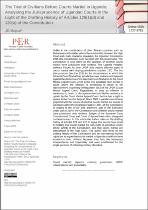| dc.contributor.author | Mujuzi, Jamil | |
| dc.date.accessioned | 2022-09-12T09:28:54Z | |
| dc.date.available | 2022-09-12T09:28:54Z | |
| dc.date.issued | 2022 | |
| dc.identifier.citation | Mujuzi, J. (2022). The trial of civilians before courts martial in Uganda: Analysing the jurisprudence of Ugandan courts in the light of the drafting history of articles 129(1)(d) and 120(a) of the constitution. Potchefstroom Electronic Law Journal, 25. 10.17159/1727-3781/2022/v25ia12023 | en_US |
| dc.identifier.issn | 1727-3781 | |
| dc.identifier.uri | 10.17159/1727-3781/2022/v25ia12023 | |
| dc.identifier.uri | http://hdl.handle.net/10566/7853 | |
| dc.description.abstract | Unlike in the constitutions of other African countries such as
Botswana and Lesotho, where the relationship between the High
Court and courts martial is stipulated, the Ugandan Constitution
1995 (the Constitution) does not deal with this relationship. The
Constitution is also silent on the question of whether courts
martial have jurisdiction over civilians. The Uganda Peoples'
Defence Forces Act (the UPDF Act) creates different types of
courts martial with varying jurisdictions (section 197). The Act
also provides (section 119) for the circumstance in which the
General Court Martial has jurisdiction over civilians and appeals
against the decisions of the General Court Martial lie to the Court
Martial Appeal Court, which is the final appellate court except in
cases where the offender is sentenced to death or life
imprisonment. | en_US |
| dc.language.iso | en | en_US |
| dc.publisher | Academy of Science of South Africa | en_US |
| dc.relation.ispartofseries | .; | |
| dc.subject | Courts martial | en_US |
| dc.subject | Jurisdiction | en_US |
| dc.subject | Constitution | en_US |
| dc.subject | Uganda | en_US |
| dc.subject | Criminal law | en_US |
| dc.title | The trial of civilians before courts martial in Uganda: Analysing the jurisprudence of Ugandan courts in the light of the drafting history of articles 129(1)(d) and 120(a) of the constitution | en_US |
| dc.type | Article | en_US |

